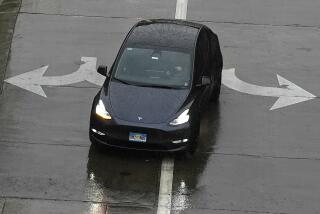Conspirators Are Targeting Electric Cars : Detroit seeks to scuttle California’s best hope for clean air and fuel efficiency.
Auto industry executives were irate when I wrote here last March that they were not committed to producing and selling electric cars, a requirement of California law starting in 1998.
They insisted that my charges be recalled, as if I had invented the writer’s equivalent of an automotive lemon. At first, I thought it was an honest difference of opinion. The car manufacturers were researching prototypes of electric vehicles; my point was that they must comply with a state law requiring 2% of sales in 1998 and 10% in 2003 to be zero-emission cars.
But the plot has thickened like smog. On Sept. 13, Ford executives wrote Gov. Pete Wilson of their intention to try to repeal California’s clean-air standard before it takes effect.
Chrysler Chairman Robert Eaton also chimed in with his opposition. General Motors said its in-house research would prove that consumers don’t want electric cars. These are the very corporate executives who vehemently denied less than a year ago that there were any such plans.
Even worse, as they plot to scuttle California’s law, these same men are in charge of the nation’s major development program for electric vehicles. That’s like leaving the brown bears in charge of a salmon hatchery. This looms as a Detroit drive-by shooting of California’s best hope for clean air and thousands of jobs in a new clean-car industry.
Pardon the cynicism, but the auto industry tends to create more valid conspiracy theories than the Kennedy assassination. In the early 1950s, auto executives conspired to destroy the Los Angeles Red Car trolley system and replace it with the freeways. In the 1960s, they were charged by the U.S. Justice Department with conspiracy to suppress new technology. They signed a consent decree promising not to do such things again, but the Reagan Administration vacated the order.
Now, the industry is in collusion again. Exploiting a Clean Air Act exemption from anti-trust laws intended to promote joint research, the auto makers are jointly planning their lobbying campaign against the California standard from Sacramento to Washington. For example, they are fighting New York Gov. Mario Cuomo and other state officials who want to emulate California’s emission standards.
Most recently, they have joined the Clinton Administration in a deceptive partnership touted as the “clean-car initiative.” Free-marketeers have objected to this combination of big government and big business; industrial policy advocates applaud it. But the key question is what the agreement really means for changing our gas-guzzling habits.
Clinton Administration officials claim that the partnership will deliver a commercially viable car getting 80 miles per gallon in 10 years. But air-quality experts who have read the agreement say that there is no such commitment, only a promise that unidentified panels of experts will soon “establish a mechanism for determining program goals.”
This is a reversal for Vice President Al Gore, who argued in “Earth in the Balance” for higher mileage requirements and “the strategic goal of completely eliminating the internal-combustion engine.”
Worse in the short run, Detroit will use this new partnership to argue against California’s zero-emission standard. We’re working with the President toward better internal-combustion engine cars, they will claim, so why build electric cars for those crazy Californians?
The answer is that voluntary partnerships with vague goals will never work. It was the federal fuel-economy act of two decades ago that forced Detroit to improve performance from 12 to 13 miles per gallon to double that level today. Though the car makers were howling against the mandate then, they never would have been able to compete with Japanese cars without it.
The same is true of California’s zero-emission mandate today. As Gore has argued, poisoned air is a mortal threat to our health and security and requires bold action. We wouldn’t fight a war with outmoded weapons, he notes, and we shouldn’t fight global air pollution with gas-guzzling cars.
The environmental imperative here promotes economic growth. In cleaning the air, we can create a new industry for the world, creating tens of thousands of jobs in Los Angeles. If we fail, that industry will belong to Japan and Europe.
The battleground for this historic conflict will be Sacramento in the coming year, when Detroit auto makers and their lobbyists attempt to dictate California’s future. Keep your seat belts on.






